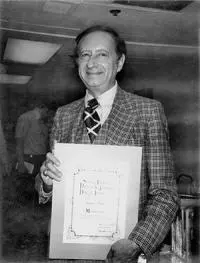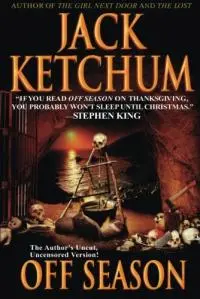I learnt this morning that Dallas Mayr, known to readers around the world as Jack Ketchum, passed away after a long battle with cancer. I stared at my computer screen, fighting back the tears, and searching for the right words. But the tears came and the words didn’t.
I’m numb, as many of us are.
Ketchum’s short story ‘Returns’ was written after he had his cat put down. In the story notes Ketchum writes:
“But the story, of course, is ultimately about connection. Not loss. In that sense, it's a celebration.”
And that is what we must do. Celebrate the life and work of Dallas Mayr. Not just a wonderful writer but a wonderful human being.
Jack Ketchum was and is one of my favourite writers. I read The Girl Next Door at a pivotal time in my development as a reader and writer, and went on to devour many more of his stories including Off Season, Right to Life, The Woman co-written with Lucky McKee, Hide and Seek, and his short story collection Peaceable Kingdom. Later, I was honoured to correspond with Dallas. Firstly in 2011 when I interviewed him for This Is Horror—you can read the interview here—and most recently last year concerning an interview on the This Is Horror Podcast. Unfortunately, he was unable to do the show, his speech was slurred after cancer treatment, but we had hoped to schedule an interview in the future. Even whilst he was receiving treatment Dallas was generous with his time and correspondence. That was the thing about Dallas, not only was he one of the ‘scariest’ guys in America—as Stephen King famously said—but he was one of the kindest.
The best way to celebrate Dallas is to read his work, preferably with a glass of single-malt Scotch and a Winston cigarette if you’re so inclined.
But it’s not just his fiction that we should read. Through his interviews and correspondence Dallas can teach us so much about writing, life, and the world itself. I’ve spent the day reading through interviews with Dallas and taking great comfort in his wisdom. Wisdom that I would like to share with you, in the hope that you, too, will find some solace.
Write To Your Idols
“In high school my sophomore English teacher, Dorothy Senner, got it into her lovely head that the entire class should write a fan letter to some writer we’d read and enjoyed recently and see if we got any response, betting that some of us would. Turns out we all did—which says something about the generosity of writers in general—but while most of the kids got a postcard, I got a short letter, on letterhead, from Robert Bloch. I'd recently read Psycho. I was delighted. Then, unbeknownst to me, my mother wrote to him thanking him and said that she thought I had some talent as a writer, and wanted to write, and would he encourage me a bit? I only found this out from Bob after my mother died. He kept her secret for many, many years. But I got another letter from Bob saying he thought my original letter very well composed, and did I have any ambitions to become a writer myself? That begun a correspondence in which I showed him pretty much everything I wrote—poetry, plays, whatever—that lasted until he died. In fact I spoke to him two nights before he died. I told him I loved him. He said, ‘I know you do.’”
![]() Lessons from Robert Bloch
Lessons from Robert Bloch
“To apply my ass to a chair. To keep your sense of humor intact at all costs. To try to be generous to young writers.”
January 2013, The ORIGINAL Van Gogh's Ear Anthology
Advice To New Writers
“Read everything, not just in genre. If you like a writer’s licks, try making them your own. Start writing short stuff, not novels. Find a reasonable schedule to write in and stick to it. … And then, as Robert Bloch once told me, if you don’t have to write, don’t do it.”
Newbie Mistakes
“Modifiers. Too damn many adjectives and adverbs. You've got to keep that train running and its fuel is verb and noun. Too much description. Do I really need to know that his hat is worn at a rakish angle, or that he's wearing a hat at all? If I don't, leave it out.”
Becoming Jack Ketchum
“As a former literary agent, when I wrote Off Season I pretended to be this guy Ketchum, whose novel I just loved. Got me off the Ballantine shit-to-read-pile. Then the thing sold so well I figured, well, nobody's going to be looking for a Dallas Mayr novel, they'll be looking for a new Ketchum novel. So I just kept it.”
Planning Stories
“I've likened writing a book to a marriage, a novella or screenplay to an affair, and a short story to a one-night stand. You don't have to prep much for a one-night stand. Normally what will happen with a short is that I'll get an idea, sit on it a while—could be days, could be years—and then another idea will come along that fits somehow with the first one and maybe a third, and voila! a short story. A first draft of the usual twelve-page story will usually take me two days, a rewrite and polish one more.”
Forget Reception Whilst Writing
“From Off Season on I wrote ’em as I saw ’em. I’ve never had reception of my work in mind during the writing of it.”
Good Prose Writing
“I’m very aware of good prose-writing being a lot like music, even partaking of a kind of music; the sounds of the words, lines and paragraphs as they strike the ‘ear’ of your perception as you read them. So I try different sounds, different rhythms. I try to race you, lull you (sometimes into a false sense of security) and then maybe hit you with the kettle drums all of a sudden. I think it’s also important to pay attention to the starts and stops. When the sounds stop—at the end of a chapter, a section of a chapter, or at the actual end of the story—I want the silence that follows to have resonance, to stay with you like a tune you can’t quite let go of. Because usually that’s when you have your best chance to contemplate the meaning of the thing.”
November 2016, Nightmare Magazine
Feel The Emotions
“I figure if I don't scare myself, if I don't feel that dread of what’s coming up next, I probably won't scare you. But the same is true of any emotion or feeling I try to get down right on the page. If I'm doing comedy, I damn well better make myself laugh. If I'm doing tenderness, I want to feel that too—I want to bleed a little. That way the feeling comes through to you.”
![]() Characters
Characters
“Gore for gore's sake doesn't interest me. Not even in film and certainly not in a book …The key again is character. You've got to be let into each character’s world enough to care about what happens to him or her, even if the person’s repulsive. We can care what happens to bad guys too. And you don't have to follow a character for a hundred pages to give a damn, either. Take Joyride aka Road Kill. … So what you've got in Joyride is a guy getting off on drive-by shootings. To him, nameless victims. But not to me. I gave each of the victims a backstory, something in their lives that makes them unique—only a few paragraphs, but enough so that you understand that this is a real human being here who doesn't deserve this shit, who is in the middle of a life cut short by this asshole. For whom you have sympathy and with whom you empathise. A novel that doesn't stir up empathy’s unthinkable to me.”
November 2011, This Is Horror.
“Whatever you’re writing, you have to stay true as best as you can to what real people would do and feel. You’ve got to empathize. I try to find the him or her in me. If I do that well, I’m also likely to find you. You’ll relate, and you’ll care.”
Writing What You Know
“I don’t have to have lived through the Napoleonic Wars in order to write about them. I just have to have done my homework. When all is said and done, it’s people we’re writing about. And human hopes and fears and drives lean toward the universal, toward what’s known by each of us if we dig deep enough to find it.”
Writing and Reading Routine
“My writing's erratic. If I'm working on a long piece I write every day for about three hours before I go brain-dead. Revisions I can go six or seven. But I take long holidays from doing any writing at all. … I read every morning for about an hour over coffee before I start the day, then intermittently during the day and evening.”
January 2017, Middle Grade Ninja
Editors, Publishers, and Self-Publishing
“I learned to trust editors but not publishers. I learned that it was best to write what I wanted to write and how I wanted to write it. I have to say I’m distrustful of self-publishing, at least at the start of someone’s career. Once you’re established and really know your craft, why not? Money goes directly to you and not the middle-man. But good editors and agents are a winnowing factor, cutting out a lot of the rubbish out there. They’re what stands between the wannabees and the real thing. They’re the ones who tell you no—and for beginning writers a lot of nos are a good thing. They make you ask, why not? They make you work harder. Learn your craft.”
Horror
“I think the best horror is essentially cautionary, showing us the worst in people and in situations, showing how us normal people can either sink or swim when faced with them. I’d say the point of horror is to tell you to watch your step, for God’s sake! And do your best to beat the cost of those missteps in life.”
November 2016, Nightmare Magazine
“In horror, whether it’s big in-your-face horror, or the little horrors of everyday life, there’s always disintegration. ‘Things fall apart. The center cannot hold …’ We all know this deep inside—and it’s the source of our greatest, nagging fears.”
Surroundings
“Our moods and emotions are often triggered by our surroundings. I dare you to stand on a mountaintop and feel claustrophobic. It isn’t possible. You’re much more likely to feel freedom, openness, expensiveness. Likewise basements, attics, closed-off spaces tend by their nature to pen us in, make us feel smaller. … Your spirit can’t soar in a basement.”
Rest in Peace, Dallas Mayr. One of the greatest of all time.
Remember, folks, everything is transient. So, write to your idols, tell people you love them, keep your friends and family close, hold your partner tight, and never take anyone or anything, or any moment for granted.
When Dallas was asked if he had any famous last words, one final thing to say to the world he said:
“Ne pas sto kalo. That’s Greek for ‘go with the good.’”

About the author
Michael David Wilson is the founder of the popular UK horror website, podcast, and publisher, This Is Horror. Michael is the author of the novella, The Girl in the Video, and the novel, They’re Watching, co-written with Bob Pastorella. His second novella, House of Bad Memories, lands in 2021 via Grindhouse Press. His work has appeared in various publications including The NoSleep Podcast, Dim Shores, Dark Moon Digest, LitReactor, Hawk & Cleaver’s The Other Stories, and Scream. You can connect with Michael on Twitter @WilsonTheWriter. For more information visit www.michaeldavidwilson.
 Lessons from Robert Bloch
Lessons from Robert Bloch
 Characters
Characters







